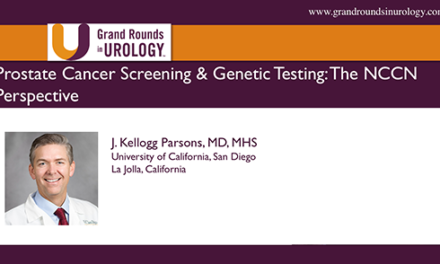Andrew J. Vickers, PhD, presented “Use of MRI-Targeting Increases Overdiagnosis and Overtreatment” during the virtual 5th Global Summit on Precision Diagnosis and Treatment of Prostate Cancer in September 2021.
How to cite: Vickers, Andrew J. “Use of MRI-Targeting Increases Overdiagnosis and Overtreatment.” September 2021. Accessed Jun 2025. https://grandroundsinurology.com/use-of-mri-targeting-increases-overdiagnosis-and-overtreatment/
Use of MRI-Targeting Increases Overdiagnosis and Overtreatment
Andrew J. Vickers, PhD, Attending Research Methodologist at Memorial Sloan Kettering Cancer Center in New York City, asserts that the current diagnostic use of MRI-targeting leads to overdiagnosis and overtreatment. He begins by stating that methods of detection such as systematic biopsies and measuring prostate-specific antigen (PSA) don’t tend to lead to underdiagnosis and undertreatment. To illustrate the reasons MRI-targeting leads to overdiagnosis and overtreatment, he displays data showing that in MRI-targeted biopsy the method of grading the core samples leads to higher grading of overall disease. Dr. Vickers points out that Gleason grade is not an inherent property of a tumor, but is instead a surrogate outcome. He then illustrates that biochemical recurrence (BCR) risk and risk of death for high-grade cancer on surgical pathology is dramatically reduced for clinically low-risk patients. Dr. Vickers cites the PRECISION trial which indicated that the MRI-targeted biopsies found far fewer low-grade cancers and more high-grade cancers, but the overall number of cancers identified was essentially the same. Dr. Vickers asserts that these results are consistent with a scenario whereby the technique simply characterized some of the low-grade cancers as high-grade. He then cites another study during which patients had both a systematic and an MRI-targeted biopsy; the MRI targeting identified more cancers that, in turn, led to more treatment. Dr. Vickers suggests this is problematic and opines that urologists do not need to find high-grade cancer in men with low-grade cancer on systematic biopsy. He supports his assertions by citing another study that followed 2,907 men for 17 years. Of those men, there were five cases of metastasis, with just two being potentially preventable. He also cites the European Randomized Study of Screening for Prostate Cancer (ERSPC) Rotterdam study which followed over 3,000 men with a negative sextant biopsy for 11 years and recorded just seven (.02 percent) deaths during that time. Dr. Vickers concludes that the number of men whose prostate cancer would have to be identified and treated in order to save one life is very large and MRI-targeting is leading to excessive overdiagnosis and overtreatment. Dr. Vickers then states that while there should be a clear clinical indication for MRI, such as negative biopsy with rising PSA, the current National Comprehensive Cancer Network (NCCN) guidelines call for treatment irrespective of the method of detection. Dr. Vickers concludes there is an urgent need for more restrictive use of MRI-targeting, evolved treatment guidelines for MRI-detected tumors, and additional research on oncologic risk of MRI-detected tumors.
The Virtual Global Summit on Precision Diagnosis and Treatment of Prostate Cancer brings together key international opinion leaders of every clinical subspecialty involved in patient care. This event is an integral part of the AdMeTech Foundation’s Annual Summit, which was established in 2016 and became seminal in shaping the state of the art and future vision for precision care. The goal of this event is three-fold: 1) Educating the key stakeholders; 2) Supporting a sustained cross-disciplinary dialogue and consensus on the best emerging clinical practices and research priorities; and 3) Expediting clinical adoption of promising novel diagnostics and therapeutics. For more educational activities from this virtual event, visit our collection page.
ABOUT THE AUTHOR
Andrew Vickers, PhD, is an Attending Research Methodologist at Memorial Sloan Kettering Cancer Center in New York City. He is also Co-Director of the PRO-CEL Core Facility. Dr. Vickers’ research falls into three broad areas: randomized trials, surgical outcomes research and molecular marker studies. A particular focus of his work is the detection and initial treatment of prostate cancer. Dr. Vickers has analyzed the ‘learning curve’ for radical prostatectomy. He is working on a series of studies demonstrating that a single measure of prostate specific antigen (PSA) taken in middle age can predict lethal prostate cancer up to 30 years subsequently. He has also developed a statistical model to predict the result of prostate biopsy, work that has been commercialized and is clinically available through Opko Diagnostics. He is a course leader for the Memorial Sloan Kettering biostatistics course and is the author of the statistics textbook What is a P-Value Anyway?




